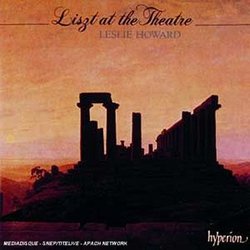| All Artists: Franz Liszt, Leslie Howard Title: Liszt at the Theatre Members Wishing: 0 Total Copies: 0 Label: Hyperion UK Release Date: 3/4/1993 Album Type: Import Genres: Special Interest, Classical Styles: Marches, Chamber Music, Forms & Genres, Short Forms, Historical Periods, Classical (c.1770-1830) Number of Discs: 1 SwapaCD Credits: 1 UPC: 034571165752 |
Search - Franz Liszt, Leslie Howard :: Liszt at the Theatre
CD Details |
CD ReviewsLiszt the Dramatizer Hexameron | 07/05/2007 (5 out of 5 stars) "Volume 18 in the Hyperion Liszt series resembles the fine sequence of "Liszt at the Opera" recordings which would eventually gross 12 CD's. The "Fantasies, transcriptions and paraphrases" that make up the present recording are based on and inspired by theatrical or "incidental" music. The composers represented are an odd grouping: Beethoven, Weber, Mendelssohn and Lassen. Furthermore, Liszt's selection of pieces is unique and even admirable. I think most listeners will be appreciative of the Beethoven and Mendelssohn fantasias, but the pieces by Lassen are marvelous rarities, whose charms improve after each relistening.
Liszt's interest in the Turkish March from Beethoven's "The Ruins of Athens" is not exactly a peculiar one. Anton Rubinstein, among others, also arranged a virtuoso transcription of the music for piano. Liszt's straightforward transcription of the March is endearing by itself, but the subsequent elaborations and full-blown fantasies Liszt indulges himself in are even more striking. Both the "Fantasy" and "Capriccio" on Beethoven's incidental music employs themes other than the March, and Liszt demonstrates a mastery of dramatic thrust. Both works are extrovert and bolstered by bravura piano-writing, but the quality of Beethoven's themes and Liszt's imagination collaborate quite nicely. Liszt's transcription of Mendelssohn's Wedding March and the Dance of the Elves from "A Midsummer Night's Dream" is more like a paraphrase. According to Howard, "Liszt's often witty interpretation of the famed Mendelssohn Wedding March was a regular recital war-horse" and I can't help but be entertained by Liszt's spectacular variations. Liszt's own stage work for a Herder play, Prometheus Bound, helped spawn his symphonic poem "Prometheus," but also a choral piece, the "Reapers' Chorus." As usual, Liszt's transcription is adroit and pianistic, and Howard feels that "among an output so vast it is perhaps an inevitable pity that this attractive trifle has fallen in oblivion." While the transcription of a Weber aria from "La Preciosa" is a welcome bonus, one of the main pleasures of this recording stems from the transcriptions of pieces by Eduard Lassen (1830-1904), who "succeeded Liszt as Kapellmeister at the Weimar court in 1858." The Symphonic Intermezzo is a splendid large-scale work in possession of some lovely themes. Howard notes, "Liszt sometimes sequentially extends the material in a way characteristic of his later works." Lassen's best ideas, however, show in his incidental music to Hebbel's "Nibelungen" and Goethe's "Faust." The outer sections of "Hagen and Krimhild" are dark evocations: the musical equivalent of an ominous Hellish pit that the composer of Funerailles and the Dante Sonata must have loved. "Bechlarn" is Lassen's gem, though, and lingers in the mind with its duality of yearning melancholy and naivete. Although the two pieces based on Faust are nothing out of the Romantic ordinary, they are equally appealing and passionately played. The polonaise of "Hoffest" has a substantial melodic idea which Liszt infuses with gorgeous harmonization and ornamentation. Bottom line: This Volume may not have the inimitable masterpieces found in the "Liszt at the Opera" series, but for reasons of special historical interest and simple listening pleasure, I cannot give this recording less than five stars. The Beethoven fantasias and the Mendelssohn paraphrase are certainly worth reviving, while Lassen's pieces have many moments of drama and beauty that are worth hearing." |

